The Cockerel










During a SPACE session at the start of the last academic year all boys in Year 9 were introduced to the idea of social entrepreneurship. They split up into small groups within each form and chose charities. Each group was loaned £25 by the school until the end of the academic year. Students came up with innovative ways to grow the initial £25 investment in order to be able to donate the profits to the charity of their choice at the end of the year. Despite the challenging conditions caused by COVID restrictions, the scheme was still a success. The achievements of some of the groups and individuals who raised the most money are listed below:
One group sold cookies at Bonfire Night to raise money for Papyrus. The group members were Akshat Kamath, Jayden Luhar, Patrice Rostami, Kiran Sastry and Harry Laithwaite. They raised £68.


Another group bought sweets online and made stress balls, which they resold in their local area. The group members were Charlie Silvester, Nathan Elcock, Ted Kay, Peter Craig and Kofi Wilkinson. They raised over £90 for Papyrus.
Levi Higham raised money through selling honey to family that he harvested from his bees. He raised £100 for Papyrus.
Alex McKie organised a sale of baked goods, old clothes and toys. He advertised his event by handing out leaflets for the event which ran across two Saturdays in August. He raised £266 for Help for Heroes.

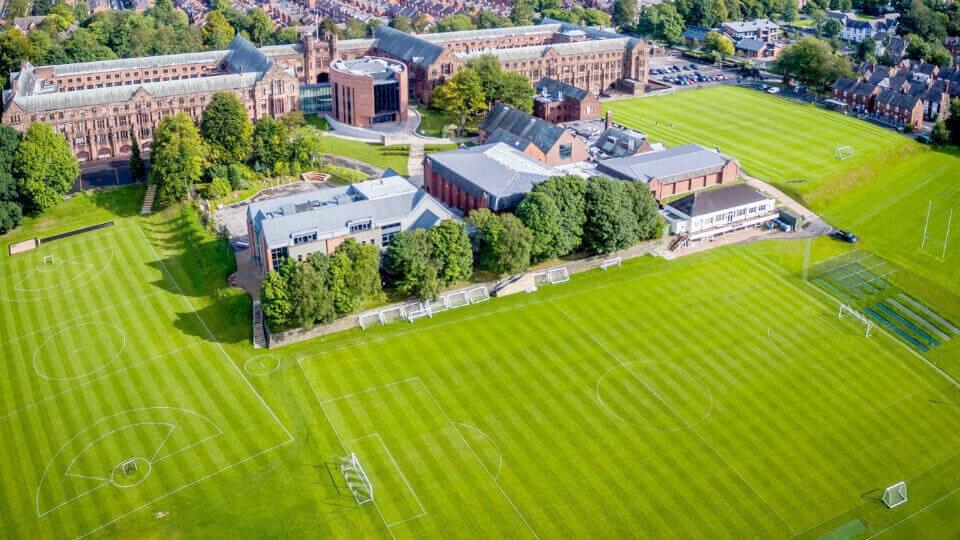
Earlier this year, Bolton School began working in partnership with The Bursary Foundation, a charity which works to connect deserving young people in deprived communities in Greater Manchester with the best educational opportunities at independent and grammar schools across the region.
The Bursary Foundation was founded by Jenny Hopkinson, a former primary school teacher and wife of Bolton School Old Boy Max Hopkinson, who, whilst teaching in inner-city Manchester, mentored a bright, hardworking Year 3 pupil called Sally, who subsequently secured a fully-funded place at an independent girls’ school, where she is now thriving. That experience inspired Jenny to found The Bursary Foundation, which partners with primary schools in deprived communities, to identify gifted and talented pupils who have the potential to thrive at an academically selective school. They are then matched with qualified teachers who ensure they are prepared both academically and emotionally for the Year 6 entrance examination. The Foundation works closely with the children’s families to help them to navigate the complex admissions
process, and then continues to offer them mentoring support throughout their secondary careers.
The Foundation specifically targets primary schools where the percentage of disadvantaged pupils is higher than average, and where the quality of secondary educational provision in the vicinity is poor. An example is a partner school in Little Hulton, where 64% of pupils receive Free School Meals and, of the eight closest secondary schools, five are rated as inadequate or require improvement. The Foundation’s pilot project was launched in 2018, with 50% of that first intake of pupils securing places, fully-funded at those which are independent schools, including Manchester Grammar School, Manchester High School for Girls, Oldham Hulme and Sale Grammar School. To date, the charity has worked with a further 43 families, with whom they have continued to work online throughout the COVID pandemic.
The George Lancashire Fund at Bolton School was established in November 2012 to fund bursaries for children living in Eccles to study at the School. Following the School’s partnership with The Bursary Foundation, from September 2020 this allocation

criteria will be widened to include children living in all areas of the Metropolitan Borough of Salford. Furthermore, any child from Salford who is awarded a 100% bursary from the George Lancashire Fund after engagement with the Bursary Foundation will also qualify to receive an annual ‘Extras’ allowance for the duration of their 100% bursary. This will provide funding for uniform, travel costs, equipment and other associated costs,
in order that they can take full advantage of all the opportunities a Bolton School education offers.
Jenny Hopkinson, founder of the Bursary Foundation, writes: ‘There is a frightening inequality of opportunity in our country. Put simply, we are wasting talent, and helping disadvantaged pupils to access the best opportunities in education is the right thing to do. We are thrilled to partner with Bolton School to identify children with huge potential in some of the poorest parts of Salford and help them prepare for entrance exams. An upfront commitment to support families with the additional costs of an education at Bolton School goes hand in hand with our ethos of holistic family support. Together, we can ensure that pupils enjoy everything on offer at this fantastic school.’

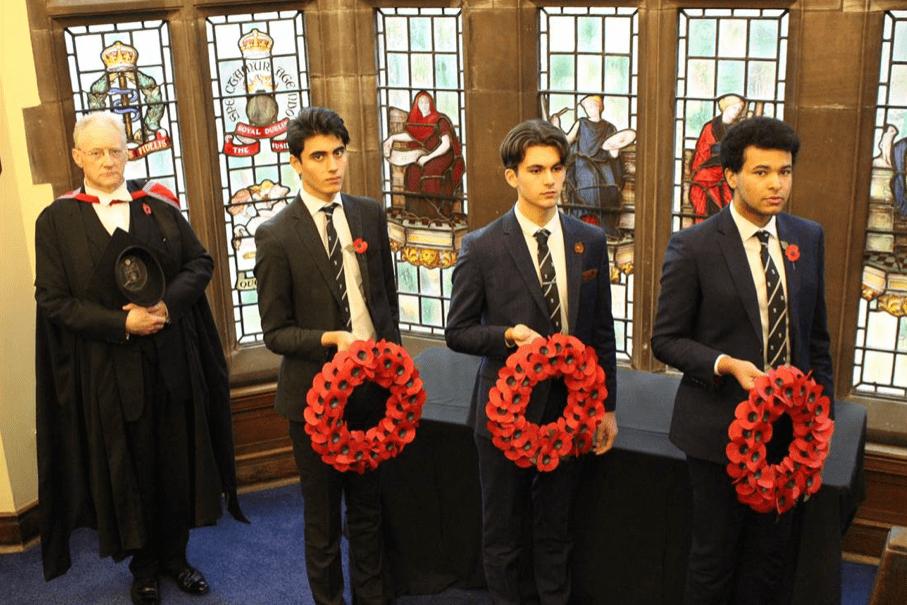


Boys watched from classrooms, some watched from home, and Old Boys tuned in from around the world as this year’s Remembrance Day Assembly in the Great Hall of the Boys’ Division of Bolton School, led by Dr. Holland, went virtual.

Dr. Holland reflected that whilst not everyone could be in the Hall, everyone did very much stand together in these difficult times and on how the global pandemic, like war, reminds us that we are very much dependent upon one another. He told how we face a virus which can be as deadly as any weapon used in war; a poignant reminder that in a time of crisis, it is the aged and the vulnerable who suffer most.
This year, he reminded us, has been an historic one in which we marked the 100th anniversary of the laying to rest of the body of the unknown warrior in Westminster Abbey. Today was a day for looking back and commemorating former members of the school who laid down their lives for this country. Beyond the two world wars, Dr. Holland asked the audience to remember all those servicemen who lost their lives in a wide range of other conflicts, including in the fight to save the Imperial Royal family in the Russian Civil War, in the jungle warfare of the Malay Peninsula, in China in the conflict of the Yangtze River, in Korea, in the Middle East in Aden and Palestine, in the Suez Canal, in supporting Oman in Arabia, in Brunei and Borneo, in conflicts on the continent of Africa in Kenya, in Sierra Leone and
Rhodesia, in four long years in Cyprus, in the liberation of The Falkland Islands, during 38 difficult years striving to keep the peace in Northern Ireland, and more recently, in Bosnia, Macedonia and Kosovo, and in Iraq and Afghanistan. Throughout the second half of the 20th Century, only one year was unmarked by the death of a British serviceman. Dr. Holland commended the boys for showing their understanding of sacrifice through fascinating displays in the History Department.

Dr. Holland reminded the audience that 2020 marked the anniversary of two monumental events - the 80th anniversary of the Battle of Britain and the 75th anniversary of VJ Day. He recalled how 1497 pilots and air crew paid the ultimate sacrifice in the Battle of Britain and how, without their courage, our lives would be very different today. Whilst the air battle went on for several months, it is the repulsion of 1,120 German aircraft by some 630 British aircraft during an attack on the south coast of England on 15th September 1940 that is woven into the fabric of this nation’s history. On 18th June 1940, Winston Churchill, addressing the Commons, and at the outset of the Battle of Britain said if we stand up to Hitler, all Europe may be free or, if we lose, we will sink into the abyss of a new dark age; let’s hope future generations will say “This was their finest hour”. On 20th August, he uttered the immortal words: “Never in the field of human conflict was so much owed by so many to so few.” Dr. Holland urged boys, when restrictions are lifted, to visit The Battle of Britain Memorial in Kent.
As is traditional in the Remembrance Assembly, former pupils who died roughly 80 years ago were commemorated. Private Frank Mather, who died aged 20 on 17 June 1940, 2nd Radio Officer Leonard Robert Armstrong, who died on 25 August 1940 aged 22 and Thomas Leslie Hope, killed on 11th November in 1940 aged 23, were all remembered. In their honour and in the honour of all members of the school community who lost their lives, Captain Charlie Griffiths and Sixth Form boys Zayd Ascroft and Nathan Burudi laid wreaths at the school memorial. The address came to a close with Dr. Holland quoting the words: “When you go home, tell them of us and say, for your tomorrow, we gave our today.”


For the first time in its long history, the annual Tillotson Lecture went virtual to allow a panel of Old Boys to discuss the potential lasting impacts of COVID-19 on our society despite the restrictions of England’s second lockdown. Rather than bringing together the wider Boys’ Division community in the Great Hall, over 200 pupils and their families congregated on Zoom to hear the thoughts and insights of four diverse alumni.
Panellists Prateek Buch, Dr. Ashish Chaudhry, Nick Johnson and Hetain Patel represented a broad range of perspectives, including the civil service, the medical profession, the hospitality sector and the arts. After a few brief words from Headmaster Philip Britton, who was the chair for the evening, and a welcome from Charlie Griffiths, the School Captain, each member of the panel was given a window to speak about how Covid and its effects are likely to shape society.
Hetain Patel (Class of 1999) is a London-based visual artist and performance maker. His live performances, films, sculptures and photographs have been shown worldwide and his video and performance work online, including his 2013 TED talk ‘Who Am
been watched over 50 million times. He focused his reflections around arts and culture, which he described both as a beacon for social change and as a way to provoke, inspire and entertain through expressing and exercising humanity. ‘What did we do in lockdown number one?’ he asked. ‘Turned to Netflix!’ Yet he pointed out that this sector, often thought of as very liberal, is built upon the same structures and foundations of patriarchy and supremacy that make it unfair to many and privilege a few. He highlighted the rise of the Black Lives Matter (BLM) movement, which he said has made it easier to have necessary conversations and for marginalised voices to be listened to, not just in terms of race, but also gender, sexuality, disability and so

I? Think Again’, have
on. He said, ‘Artwork is political. Culture has great influence. My hope is that the arts will make for a fairer, more just and more equitable arts world, but more importantly and beyond that, it will push towards a fairer, more just and more equitable world full stop.’


Nick Johnson (Class of 1984) began by addressing Hetain’s comments, agreeing that he too wanted to talk about ‘profound change’. He briefly mentioned the liberating effect of punk during his lifetime before moving on to discuss another profound cultural impact: the 2007/08 financial crisis. He said that he thought at the time, ‘This cataclysmic change has given us the opportunity to redefine capitalism.’ However, he described that idea with hindsight as naïve because very little changed: people wanted to return to the comfort zone of what they had always done before. Despite this, Nick himself made a change: following a decade of being assimilated into ‘the establishment’, and despite having an impressive CV as a result, he turned his life around and began trying to affect transformation and profound change in local communities by curating people
and what they do. His efforts in Altrincham have now become the benchmark for how to transform and revitalise towns. He warned that the chances of doing things differently post-Covid are remote, as people will want to revert back to how things were once again, but still championed the possibility of redefining our relationships around regions, regional identity, trade, travel, and enjoying more of what is on our doorstep rather than pursuing a global economy. He highlighted the importance of debating the real implications of how we can re-engineer society now there is an opportunity to do so once again.
Dr. Ashish Chaudhry (Class of 1999) is a GP who, during the pandemic, has implemented innovative ways of working to meet the demands of health care delivery to his patients. He began his speech with his own, individual experience of catching Covid, which developed into Long Covid, and concluded by saying that although he is almost recovered physically, the trauma of the experience lingers on. He said: ‘Although Covid entered our psyche as a medical illness, this is not about health any more. The virus has mutated and
evolved, not in a genetic sense, into a social disease. It has reengineered how we think, feel and behave in our environments.’ He talked about how this illness has forced humanity to confront our vulnerabilities and said that, while a vaccine is pivotal, alone it will not be enough to get our lives back on track. He humanised the statistics: the 60,000 people in the UK who have died from Covid would fill a football stadium, and 500 deaths a day is the same as a jumbo jet falling out of the sky every single day. He also spoke about how Covid has attacked the weakest links in our society and magnified the suffering of those already vulnerable, and raised concerns of a mental health crisis on the horizon. However, he was also able to discuss ways to rehabilitate through ‘courage, compassion and connection’ and by reconnecting with other people to regain meaning in our lives. His final message was: ‘Practise kindness and gratitude. Be humble. It’s not over.’
affected policy.

The final speaker was Prateek Buch (Class of 1999), Senior Data Advisor at the National Leadership Centre (NLC) in the Cabinet Office. He picked up on the theme of privilege that had run through his fellow Old Boys’ comments, calling it a ‘doubleedged concept’ which brings with it a moral and ethical obligation to use that privilege to innovate. The unequal impact of Covid, along the lines of geography, socio-economic status and ethnicity, has emphasised privileges and ‘revealed in stark and uncomfortable terms the need to understand the people we serve’. However, the challenges of the pandemic have already
Initiatives to promote diversity, inclusivity and accessibility within the civil service have been accelerated. The rigidity of barriers within bureaucracy have been reduced, and increased porosity between agencies, departments, the government and other sectors has improved communication and systemic thinking. However, he agreed with Nick that the challenge is in not pressing the reset button, but instead capturing what has been learned, embedding that as the new modus operandi and taking the opportunity to create profound change. He said, ‘We are obliged to take it on, once we have taken the steps needed to ensure we are safe.’
The Headmaster thanked all four speakers for their reflections before beginning the question and answer session. Zoom’s features allowed the audience to send in their questions throughout the talk and Mr. Britton pulled out several of these alongside prepared questions to continue the conversation.
The panellists discussed what society is and the juxtaposition and interplay between local and global society, speaking about the need for balance between the two, the importance of seeing global issues as our problems, and the way the pandemic has turned our lens closer to home by necessity. They also talked about whether improvements in technology promote connection or distance between people, with all four Old Boys agreeing that there is still a need to have the realness and authenticity of inperson experiences, and the need for quality communication both online and offline. Questions about whether technology can or should open up access to the arts and whether the healthcare system should shift its focus to a more proactive and preventative model were answered by Hetain and Ashish respectively, and all four weighed in again on whether there will be any long-lasting change post-Covid. Mr. Britton ended the Q&A with a Year 13 student’s question, which he challenged each Old Boy to answer in just one minute: ‘How can we rebuild a post-Covid economy?’ They each provided concise and thoughtful answers, which focused on accepting the symbiotic relationship between health and economy, the need for equality, the provision of economic support and resilience within the economy.
Finally, the Headmaster asked all four Old Boys to provide a message to current pupils. Their comments were as follows: Hetain: ‘If something doesn’t feel right to you personally, speak about it.’
Nick: ‘Don’t consider that you need to know everything before you do something. Naivety is often a put-down, but it’s been one of the greatest qualities that I’ve possessed.’
Ashish: ‘Be courageous and believe in yourselves.’
Pratik: ‘Whatever future you envisage, you are the future. It is your change that you must be, to coin a phrase. It is your world to seize, even more so today than before.’
The evening was brought to a close by Vice-captain Thomas Britton. He thanked the panellists for their insightful comments, which showed a fascinating diversity of thinking with common themes throughout.
The 2020 Tillotson Lecture was the third panel discussion in the event’s 48 year history, following on from the 2011 panel about the projected aftermath of London hosting the Olympic Games and the 2015 panel which focused on the future of Bolton as part of Bolton School’s 100/500 Anniversary celebrations.


Old Girl Professor Sarah Mercer (Class of 1992) connected with Bolton School pupils via Zoom to speak about her experiences studying Modern Foreign Languages (MFL) at university, living and working abroad and her career in teaching English as a Foreign Language. Her talk was tailored for an audience of students in Years 9 to 12 from both Divisions.
Sarah studied French, German and Politics at Royal Holloway, University of London, and was able to share with the group her experience of the year abroad and all that it entails. She also gave a brief overview of her career, which has led her to become a Professor of English Language Teaching (ELT). She is now Head of English Language Teaching at University of Graz in Austria. One of the key messages in her talk was that it is important to weigh up what is important and what you want to do. She also pointed out that the people she studied alongside at university have gone on to work around the world in a wide range of fields.
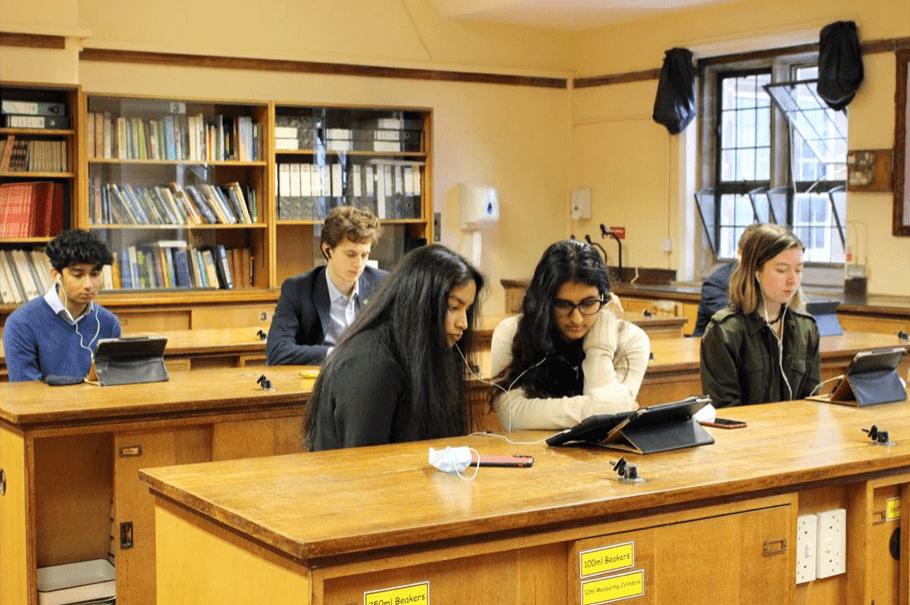
After her address, pupils were invited to ask Sarah their questions. One student began by asking Sarah’s favourite German word (gemütlich, meaning pleasant and cheerful) and, with the ice suitably broken, the questions began to pour in.
and ended up here.’ She said, ‘Follow your heart and your interests, you’ll enjoy it and put the work in.’

Asked how she decided where to go on her year abroad, she talked about the structured plan needed for this kind of experience and the kind of exchange programmes that are available through universities, as well as speaking more about the teaching assistant positions that many students fill in their year abroad. She also expanded on the kinds of fields her university friends now work in and the opportunities that can become available through MFL study.
Sarah revealed that she wouldn’t change the fact that she studied both French and German, even though she doesn’t use French much, because of the cultural perspectives she gained as part of the course. She talked about how literature, linguistics and cultural studies are all part of language learning at university.
When asked if she was surprised by any of the opportunities that presented themselves in her career, she said that her whole career was like that because she ‘just kept taking the next step
Finally, she was asked about the hardest part of the year abroad, and answered that for her, it was the fact that she was cut off from home, with letters rather than email used to communicate. However, she also said that this aspect of the year abroad might have been a good thing as it encouraged her to get involved in life in the new country. She advised those who might go on a year abroad in future to ‘say yes to everything’ and meet as many new people as possible, as this is the way to gain confidence and get the most out of the experience.



As we venture into much more complex and technical rivers, where life and death begin to merge, it is paramount that everyone involved is aware and competent in Safety and Rescue. Whether it be rescuing a stranded boat or an unconscious paddler, the Foundation Safety and Rescue course we completed prepared us to face anything out on the water. Despite it being somewhat cold, only to be expected mid-winter in the UK, the course was extremely enjoyable and helped to provide all the foundations in Safety which will be built on next year in the White Water safety award. With such a great group of lads and excellent staff, the course soon flew by, and only the following day I utilised my knowledge to save a paddler on the infamous River Leven. I’m excited to see where the next course takes us!

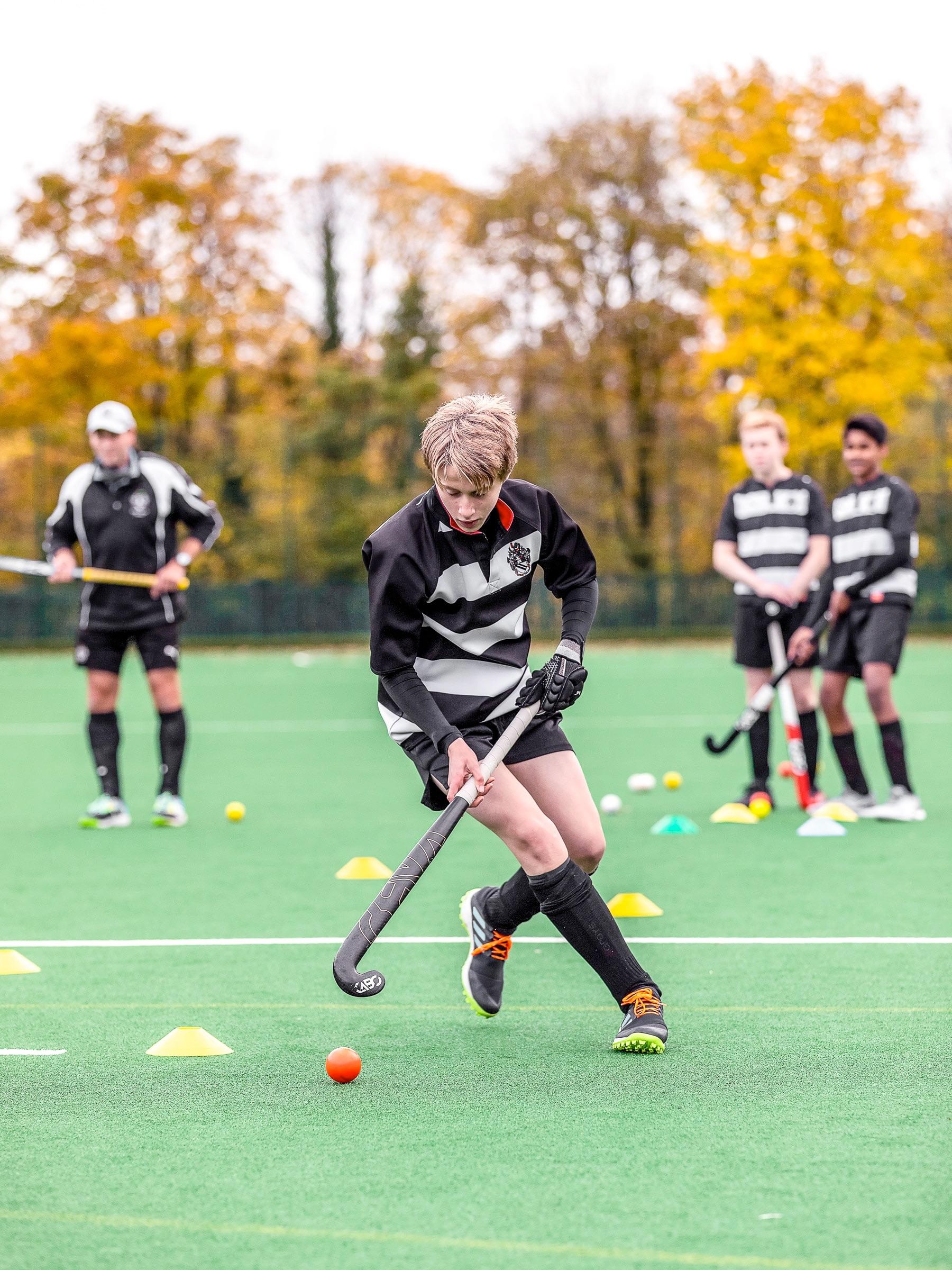
When school started back this term, we never realised the impact that Covid-19 would take on our usually busy fixture list. To-date we have played no matches and for the 1st XI & 2nd XI hockey teams that are made up from Year 11, 12 & 13 boys, we have not even been able to train together as squad.



Throughout Autumn Term, hockey has been one of the sports the Years 8 and 9 have undertaken in their form groups with walks up to the Leverhulme Pavillion to use the AstroTurf pitch and some great in-form non-contact matches at the end of each sports lesson.
Year 10 Hockey has been well attended and this group have really applied themselves to the coaching provided and in the small sided non-contact match play we have managed have used these skills and more as they develop their game intelligence.
From Monday 21st September 2020 senior teams (1st & 2nd XI ) training has been on, but in separate zones for each year group to ensure they remain in the protective COVID-19 bubbles that the school had set up for each of these year groups. With the added restrictions of COVID-19 safety recommendations for school sport from the DCMS and the guidance given by England Hockey for their ‘return to play’ strategy the coaching has, for this term, become very skills based,
concentrating on individuals’ abilty improvement and pitch awareness and hockey intelligence. This is different from a normal year where the squads would be working on their team positioning, interplay, ball transfer, set plays, team defending, counter-attacking and game development. What a different year it makes it!
Despite all this, the hockey squads continue to develop players capable of representing the School Hockey team when we get back to school fixtures and we have seen some players go to local clubs to ensure more coaching, player growth & development and match play opportunities are found.

The senior school years have trained well with our star players leading by example in developing themselves as assistant coaches and running skill exercises for their year groups at training and, due to this, numbers in each group have slowly increased.
Tom Hussain (13c), Max Turner (12b) and Mihir Patel (11f) have been selected for the England Hockey Performance Centre (Fylde) designed for students who have progressed beyond the county system.
We’ve had our challenges, but we’ve had some fun as well, with Mr. Sutcliffe inventing some most extreme hockey practices so as to challenge all our players and ensure everyone enjoys their hockey.
We hope to expand hockey to Lower School pupils next term.
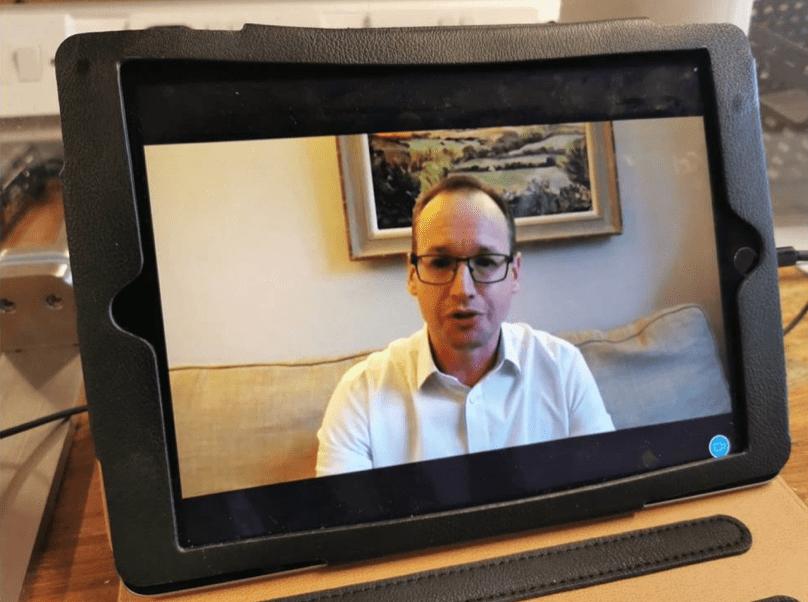
Old Boy Simon Turner (Class of 1994) offered his life advice to pupils via Zoom. He studied Law at Magdalen College, Oxford, and completed pupillage at Lamb Chambers before taking a position at a firm of solicitors in London. After several years working in finance and corporate restructuring, he was offered the opportunity to change career and, for the past nine years, has been Managing Director of the Camellia Foundation.

Simon began by saying that he wanted to talk about decision making rather than his career. He went on to give the audience of students in Years 10 to 13 six pieces of advice, all tied back to anecdotes from his own career and life.
First, he recommended that everyone should be reflective, observe their own decision-making and make decisions consciously rather than passively. He said that this helps you to consider all the options equally, without prioritising those within your personal experience. He related this back to when he was asked to set up a charity instead of continuing to work in his legal career – a massive change.
This led him to his next point: be courageous in making decisions. He said that it can be all too easy to fall in line with others’ expectations, which can help us to achieve more, but equally can cause regret. He talked about having the courage to treat the familiar and the new equally, and his own difficult decision not to become a barrister even though that was his long-term ambition. He also said that there sometimes is no right answer, but it’s necessary to have the courage to take your own path. Determination and the will to see things through is also important. He discussed how unhappy he was during his first year at the bar, and the persistence needed to get past that, earn the qualifications needed, and progress. He said, ‘Do all you can to see things through, don’t give up out of boredom or difficulty. Keep your eyes on the prize.’ He also talked about how the ‘prize’ might not be something obvious at the time, but rather something you or others will find valuable later.
Simon next talked about how broadening your horizons can lead to new places and experiences, and help to combat the paralysing fear of the unknown. He advised everyone to read
beyond their field. In his case, his interest in physics, including the philosophical aspects of physics, ultimately led to him meeting the Dalai Lama!
He advised the audience to always be trustworthy and compassionate. The importance of having integrity, sharing credit and taking responsibility were exemplified in a story he told about a senior colleague taking the blame for a mistake Simon made, which he was then able to pay forward later in his career. He also talked about the importance of forgiving others and yourself, and the need to put mistakes into context in order to move forward.
Finally, he closed with a quote from Socrates: ‘The unexamined life is not worth living.’ He said that it is possible to spend years on ‘autopilot’, and it is important to both observe and participate in life. He said, ‘An examined life is most definitely worth living.’

During the talk, he recommended several books which he said had made a big impression on him: ‘Thinking Fast And Slow’ by Daniel Kahneman; ‘Seven Brief Lessons on Physics’ by Carlo Rovelli; ‘Give and Take: A Revolutionary Approach to Success’ by Adam Grant; and ‘A Fearless Heart: How the Courage to Be Compassionate Can Transform Our Lives’ by his colleague Thupten Jinpa, a copy of which is in the Boys’ Division Library.
corporate law. He advised that in order to succeed in any legal career, it’s necessary to pull out all the stops and spend as much time as possible on doing a good job. He also talked about what corporate law is like morally speaking and described a situation he was involved in which ‘didn’t pass the ‘smell test’ and which he advised his bosses not to touch. When asked about the most challenging legal situations, he talked about the difficulty of not knowing what is the ‘right’ answer and how those in the legal profession must learn to live with this uncertainty.


Harry McDermott, a Year 12 student at Bolton School Boys’ Division, has run an impressive 84km in November for the men’s charity, Movember.

Harry was raising funds in memory of his grandfather, Terence Crawford, who passed away earlier in the year following an 8 month battle with prostate cancer. He chose to support the Movember charity because all the money raised goes towards supporting men's health, suicide prevention and important research into the treatment of prostate and testicular cancer. He ran 84km – often in the evening through dark winter nights – to bring attention to the 84 men lost every week to suicide in the UK and, to date, he has raised a total of £865 with donations still coming in.
Reflecting on his fundraising, Harry said: “I would like to thank all my friends and family for their support. If you would like any further information regarding the Movember charity, it is available at www.movember.com.’
Harry is a keen sportsman, playing rugby in the 1st XV at Bolton School, for Bolton RUFC and at Westhoughton Lions ARLFC. He also swam competitively for Bolton Swimming Club and hopes to qualify as a swimming pool lifeguard later this month.


The Stoner Prize, named after Old Boy Edmund Stoner, involved creating a presentation of any physics topic. This could have been about anything from forces to stars. Levi Higham and Dylan Lincoln decided to create a video, showcasing the physics of their respective musical instruments; the guitar and the saxophone. This involved researching a topic that was for Year 12’s. The physics of the instruments involved standing waves, which for the saxophone, involved blowing on the reed; this oscillates the sound as it moves down the instrument. This was really interesting for the boys, as they have both been playing their instruments for a number of years, and didn’t really know the science behind the music. At first, they found that it was a difficult topic to understand, but they both really enjoyed the experience of learning something new and practising their public speaking skills.




This year saw a first for the Model UN team as they participated in their first ever online conference. The Oxford Global MUN conference took place digitally over two weekends in November, with Zoom backgrounds replacing the familiar sights of the Sheldonian theatre and Oxford colleges. Hosting the conference remotely meant it was the most international one yet. On Friday, our students gathered in the Leverhulme Suite for the opening ceremony and listened to an inspiring talk from Sir Mark Lyall Grant on the global political landscape. The conference then took place over two consecutive weekends with our students joining from home as the nation was in the middle of a second lockdown. Traditions were kept and we met every morning on Zoom for rousing team talks. Our delegates adapted quickly to this new way of working, expertly using their debating skills over Zoom and collaboratively working on resolutions using Lark. They debated over
a number of issues ranging from the European Green Deal to the issue of access to education for refugees. Our students enjoyed great success at the conference and there were a number of notable individual achievements. Jack Swires, Thomas Britton and Zayd Ascroft were named Outstanding Delegates in their committees. Lily Rimmer was awarded best position paper. Well done as well to the rest of the team, Finley Littlefair, Matthew Settle and Christian Stapleton, for their involvement and hard work under challenging circumstances.
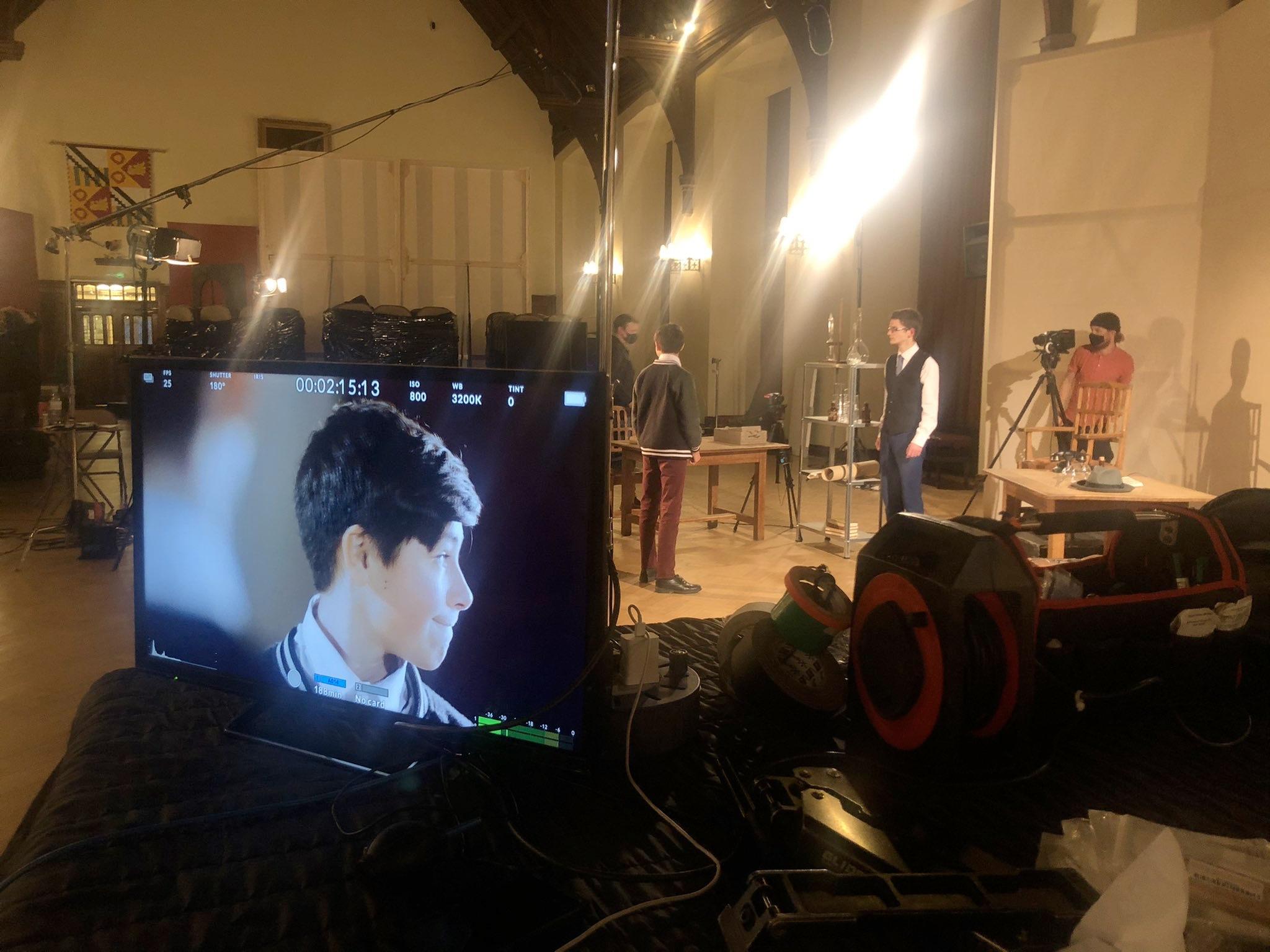


This year, staff and pupils at Bolton School Boys’ Division had to be even more creative than usual when considering their annual festive dramatic production. Employing the services of Sitcom Soldiers, a video company founded by Old Boys Ben Thornley and Chris Jones, the School settled on producing a filmed version of ‘It’s a Wonderful Life’. The cast auditioned online, rehearsed via Zoom for months, rehearsed in-person for just a few days, in bubbles, and then rose to the challenge of socially distanced theatre for film.
The Great Hall at the School was a socially distanced film set for three days. A couple of the cast had to isolate at home during the filming days, but through the wonder of technology were still able to feature in the film as celestial voices. Some elements of the production were perhaps more muted than they would usually be due to COVID-safe approaches and the piece was distanced according to year group bubbles. The characters playing George, young George/ Tommy and Mary were part of the same household bubble.

The show is reviewed in full here by former pupil Sam Warburton:
'For this year’s festive production, pupils staged an adaptation of Frank Capra’s classic Christmas film ‘It’s a Wonderful Life’.
This iconic tale follows George Bailey. George runs the Bailey Brothers Building
and Loan, a small business which supports the townsfolk and prevents the villainous businessman Mr. Potter from gaining full control over the town. In serious financial trouble, George contemplates suicide. His guardian angel, Clarence Odbody, is sent from Heaven to save George. Clarence shows George how his kindness has helped others. With George still suicidal, Clarence shows him how the town and his friends would suffer if George had never existed. Realising he has actually lived a wonderful life, George rushes back to his family and the townsfolk donate enough money to save the Building and Loan. Clarence is finally given his angel wings and all ends happily.
and Finley Littlefair, who played Mr. Potter and Clarence respectively. Jude’s portrayal of the sneering and ruthless Mr. Potter was simply spot-on and his accent and delivery were masterful. Finley conveyed the optimism and joyfulness of Clarence excellently. He was the emotional anchor of the piece. Strong supporting performances came from Emilie Fielding (playing George’s loyal and caring wife Mary), Anthony Johnson (playing George’s warm but bumbling Uncle Billy), Rosalyn Harper playing Violet Bick (a long-time admirer of George) and Matthew Settle (playing George’s successful brother Harry).
The entire cast performed superbly. Charlie Griffiths took on the role of George, perfectly capturing a man whose kindness and selflessness manage to overcome despair and hopelessness. Standout performances came from Jude Ashcroft
Despite the immense challenges posed by the pandemic, the production was a technical triumph. Scenes from Capra’s film were cleverly integrated into the play, fuelling a poignant and warm feeling of nostalgia. The online format also allowed the many flashback scenes to work seamlessly. The use of lighting was effective, particularly in scenes with Mr. Potter who is often


flanked on both sides by his imposing shadow. The costume was authentic and props were used well. Watching George struggle to sit in a deliberately small chair in Potter’s office was great fun.
Whilst we could not come together physically to watch this performance, the cast and crew managed to put together a full evening of entertainment. Opening and closing comments from Charlie and Jude set the mood well and musical numbers from Josh Kay in the interval added authenticity to the evening. A short film was also played in the interval, with the cast reflecting on what a wonderful life means to them.
At the end of a long and difficult year, this show could not be more timely and welcome. ‘It’s a Wonderful Life’ is a beloved classic because it is simple, sincere and heart-warming. This is what the case and crew managed to capture. The show’s final moments, which saw the cast singing Auld Lang Syne in the Great Hall together epitomised this. Thanks must go to all involved, including the cast, school staff, parents and professionals from the Octagon and Sitcom Soldiers for putting together this brilliant and creative adaptation.'




This half term has seen two key eco-events: Youth Climate Summit 2020 and the inaugural Wildlife Photography Competition.


The School got involved in the Youth Climate Summit, a five-day virtual conference, with speakers talking about issues from marine conservation to fast fashion. Years 7 to 9 watched excerpts during their lunchtime sessions with a focus on the work of young activists. On the final day, Year 12 ambassadors led climate discussions with Year 7 forms.
Ben, one of the Year 12 ambassadors, said “the idea of bringing awareness to younger years about how the world is changing drastically is very important not only to me, but in general as it is a big task to reverse the climate change that has already occurred.” He commented, “The Year 7 students I was talking to were all very engaged in the subject and I had many hands up eager to answer my questions. They even told me of ways that they are beginning to change at home such as, less food waste and walking or cycling where they can. It was very surprising to hear that due to the sessions they had watched only a few days before, they had already made such changes at home for the environment.”
James, a Year 9 eco-committee member, said “We enjoyed watching the videos and learning about what we can do to help the environment. I have asked people in our year and the response was almost universally positive.”
The Wildlife Photography competition was the brainchild of the eco-committee, who were looking for ways for students to engage positively with biodiversity. They knew that over lockdown we were all spending more time outside and appreciating the nature around us. The theme this year was ‘Wildlife around our homes’ and over thirty entries were received. The winner was Matty Wright’s ‘Cheeky roe deer in the wild meadow’ and the runner up was Jamie Logan’s ‘Chaffinch take off’. Two Park Road boys also enjoyed success with ‘Ducks in flight’ and ‘Pigeon on a stick with a stick’.



Despite the current restrictions, there has been a great deal of activity within the Modern foreign Languages department.
Ali Ahmed, Pat Bentley and Thomas Martin came in the top 10 in a national Russian translating competition conducted by the University of Sheffield. The boys won a £25 Amazon voucher and an invitation to an elite online workshop with staff from the University of Sheffield. The translation was by no means easy – it was a piece of modern Russian literature by Ksenia Buksha that they had to put into English and there is no English version of the book, Churov and Churbanov, on the market yet.
In the North Schools’ Modern Languages



Debating competition the French team consisting of Charlie Middleton and Patrick Bentley are through to the Semi-final, having defeated Manchester High School for Girls’ in the

Quarter-final. They successfully defended the motion that “Education will be better thanks to the learning experiences during COVID-19.” The German team consisting of Thomas Britton and Jack Danson just missed out at the same stage of the competition to a strong Stockport Grammar School team. Our Spanish team consisting of Will Jackson and Oliver Fairclough competed valiantly, but unfortunately lost in the Quarter-final to a strong Withington Girls’ team.
Year 8 boys Ethan Herring, William Hope and Zain Ahsan Ali participated in the Regional Final of the National French Spelling Bee, and received certificates for participation in a recent Celebration Assembly
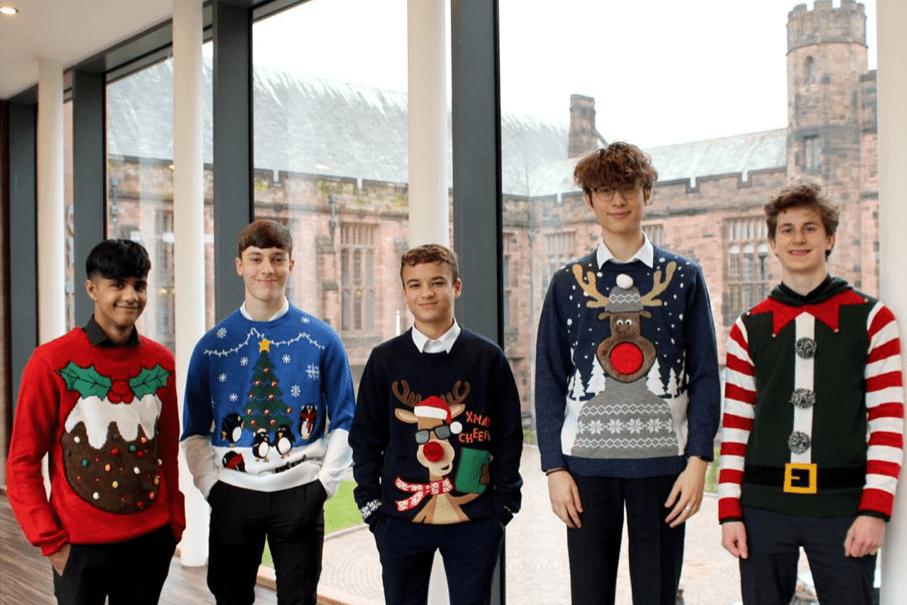

Christmas Jumper Day saw Sixth Form students and staff bringing festive cheer to the corridors and classrooms at Bolton School Boys’ Division, and all for a good cause.
The aim this year was to raise enough money for Bolton Hospice to send three Hospice at Home nurses to visit a patient this Christmas, allowing them to remain at home surrounded by their family. The Boys’ Division rose to the occasion smashed that initial goal of £318, raising a grand total of £530 for the Hospice!

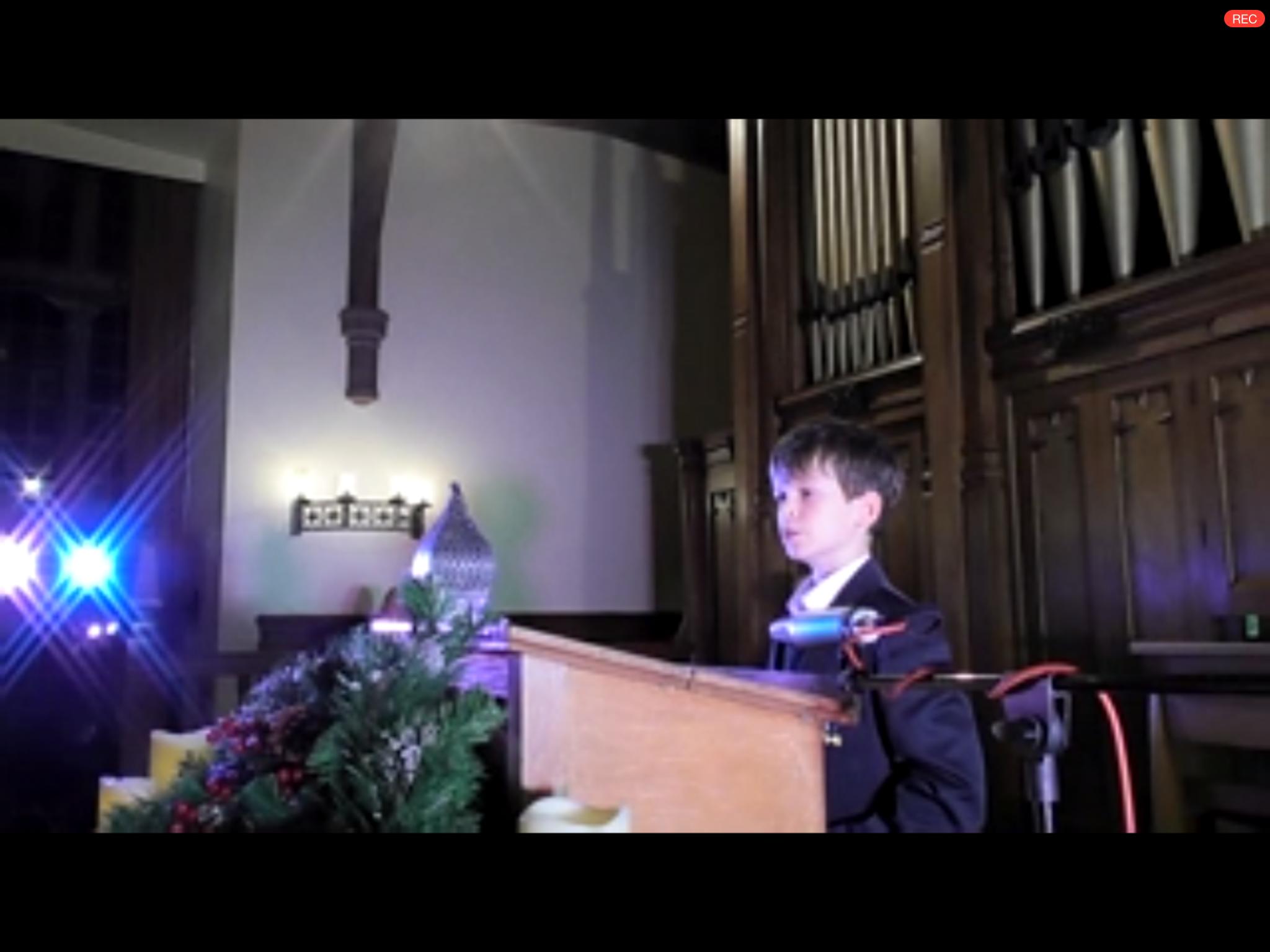


There was no lessening of festive cheer and warmth as Bolton School Boys’ Division’s Christmas Festival went virtual this year. Headmaster Philip Britton anchored the event live from a socially distanced Great Hall and the evening comprised the traditional mix of congregational carols, readings, prayers and reflections, some of which were pre-recorded.
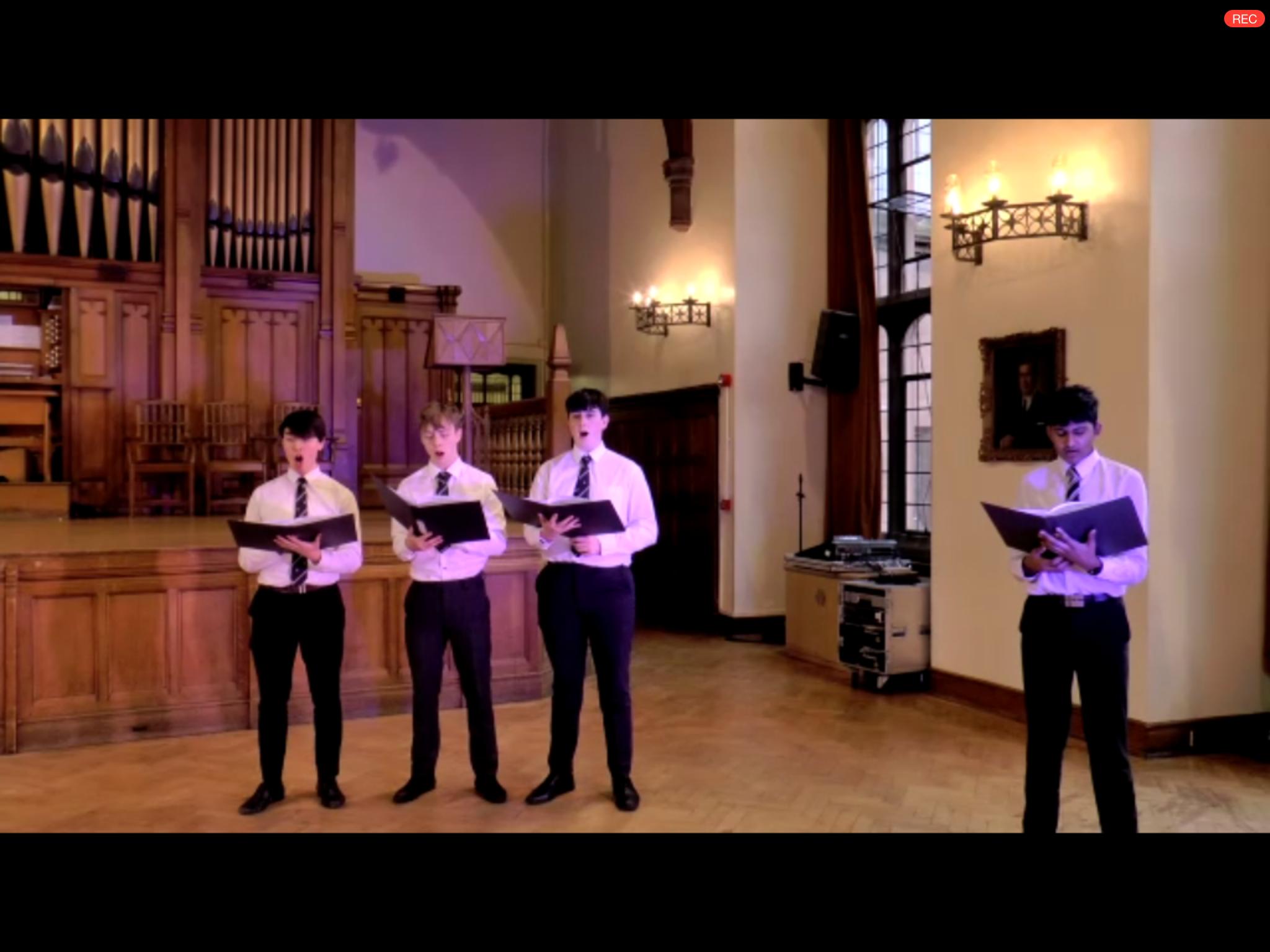
After an invitation to worship by Year 13 student Nathan Burudi, Once in Royal David’s City proved the popular curtain-raiser that it always is and undoubtedly had Zoom viewers at home delightedly lending their voices. Henry Hughes of Year 7 offered a confident and delightful solo rendition of the first verse. This was followed by the initial reading of the evening from Jeremiah 23: v5-6, which was read by Year 7 boy Dhilan Jacobs; then came ‘The Advent Virus’, a reflection by Year 13 student Thomas Higham.
Girls’ voices were added to the evening with the Joint Chamber Choir’s wonderful rendering of Baby in an Ox’s Stall before Year 8’s Luke McGuigan Lazo made a reading from Luke I: v26-33 and Christopher Ejeh of Year 7 offered the reflection ‘Christmas Thoughts’.
Choirs, in appropriate year group bubbles, sang a joyous Hark! The Herald Angels Sing! before James Wilson (Year 8) also read from the Book of Luke, choosing ‘The Magnificat’ v46-55 and Alex Chadwick (Year 7) gave a reflection on ‘All Those Amazing Dreams’. The Senior Concert Band then played an upbeat and life-affirming version of Shine Bright.
The fourth reading of the evening was read by Ed Goodfellow, a Year 8 pupil and was of Matthew II: v1-3 and v7-12. Bomi Shodipo from Year 7 followed this with the reflection ‘The Work of Christmas Begins’. The Chamber Choir Boys offered an ethereal and spiritual singing of Carol of Winter Peace.



Headmaster Mr. Britton read from John I: v1-14 before Year 13 student Jude Ashcroft delivered ‘Twas the Night Before Christmas – An Advent Reflection’. The Senior Concert Band then returned to centre stage playing a very festive and foot-tapping Feliz Navidad.
The special guest for the evening was Rev. Dave Brae, the Associate Minister at St. Peter’s Halliwell and Young Adults Pioneer in Bolton town centre and he offered the audience a meditation which focused on Joseph, one of the heroes of scripture that, he believes, is often overlooked. He told the boys
that reflecting on the story of Joseph should teach them about honour, humility and resilience as they grow up. Year 7 boy Leo Simpson read ‘A Prayer for Christmas’ before the ceremony ended, as is traditional, with an uplifting singing of O Come, All Ye Faithful!. The retiring collection, online this year, was for Barnardos and Create Boltones, which offers an opportunity for people with a learning disability to play music and have fun.
Editor: Miss K.S. Wrathmell
Contributors: Mr. M. Power, Mr. J. Newbould, Miss A. Bradshaw, Mr. D.F. Teasdale, Levi Higham 10b, Alexander McKie 10a, Mr. A.C. Robson, James Roberts 12d, Mr. N. Sutcliffe, Miss C.M.V. Buttigieg, Miss N.R. Lord, Miss E.A. Bramhall, Mr. P.G. Davidson, Mr. J.C. Bleasdale
